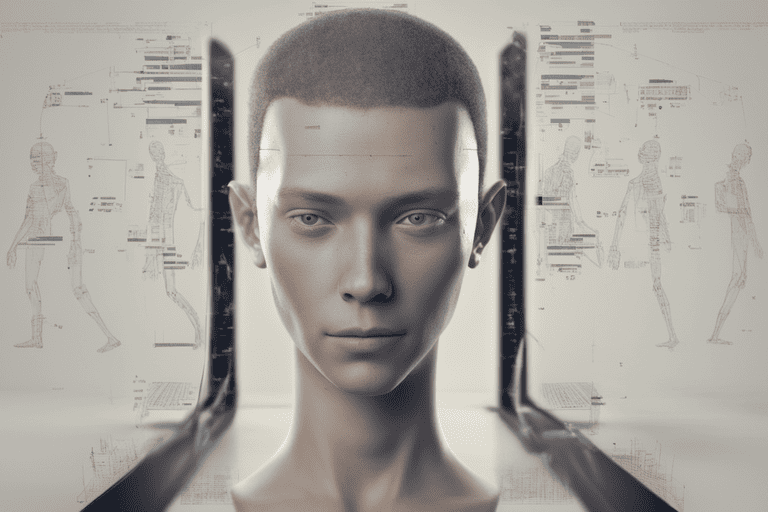
Digital Doppelgangers – Welcome to 1984.
I just watched a documentary on YouTube about digital doppelgangers that was literally frightening. Here it is if you would like to watch for yourself:
How Google, Facebook and others use our most personal secrets against us | DW Documentary
This is not some future technology or some dystopian Philip K Dick novel – this is what is happening ‘now’ – or at the end of 2023 as I write this post.
What are Digital Doppelgangers?
Digital doppelgangers, created by analysing our digital footprints, are virtual representations of individuals based on their online behaviours and activities. These digital counterparts can reveal various aspects of a person’s life and personality.
How are Digital Doppelgangers created?
Creating digital doppelgangers through the analysis of digital footprints and behavioural residue can indeed raise numerous concerns and negative consequences, reminiscent of George Orwell’s dystopian world in “1984.”
Why should we be concerned?
I asked ChatGPT (that I have nicknamed Sofi) to come up with 20 negative concerning responses re digital doppelgangers with reference to George Orwell’s famous, “1984” book:
- Mass Surveillance: Online platforms and governments can use digital footprints for surveillance on individuals on a massive scale, akin to Big Brother’s surveillance in “1984.”
- Loss of Privacy: The extensive tracking of digital footprints erodes personal privacy, leaving individuals with little to no space for private thoughts and actions.
- Data Breaches: The accumulation of personal data for digital doppelgangers increases the risk of data breaches, exposing sensitive information to malicious actors.
- Manipulation of Opinions: Digital doppelgangers enable targeted manipulation of public opinion, leading to misinformation, propaganda, and divisive political tactics.
- Thought Policing: AI algorithms analysing digital footprints can lead to thought policing, suppressing dissent and non-conformity.
- Social Credit Systems: Some countries implement social credit systems that rely on digital footprints, impacting individuals’ access to basic services and freedoms.
- Algorithmic Discrimination: Digital doppelgangers can perpetuate bias and discrimination, as algorithms may unintentionally favour certain groups and marginalize others.
- Employment Discrimination: Employers might misuse digital footprints to make biased hiring decisions based on online activities, negatively impacting job seekers.
- Psychological Profiling: Advanced AI can create psychological profiles based on digital footprints, potentially leading to manipulation of emotions and behaviour.
- Security Threats: As AI and AGI become more omnipresent, the risk of AI-powered cyberattacks increases, potentially causing widespread damage.
- AI-Generated Deepfakes: AI can manipulate digital footprints to create convincing deepfake videos and audio, causing misinformation and social unrest.
- Lack of Consent: Users often provide data without informed consent, leading to the unauthorized use of digital footprints for various purposes.
- Loss of Autonomy: The constant analysis of digital footprints can diminish individual autonomy and free will, similar to the control exerted by the Party in “1984.”
- Invasion of Personal Space: AI-driven advertising and recommendations invade personal online spaces, making it difficult to escape commercial interests.
- Algorithmic Echo Chambers: Digital doppelgangers can reinforce pre-existing beliefs and isolate individuals in echo chambers, impeding critical thinking.
- Stifling Innovation: Strict monitoring and control of digital footprints can stifle innovation and creativity, limiting societal progress.
- Government Overreach: Governments can misuse digital footprints to suppress dissent, silence critics, and maintain authoritarian control.
- Fear of Expression: The fear of being constantly monitored and judged can lead to self-censorship, stifling free expression and creativity.
- Social Manipulation: AI-driven systems can manipulate social relationships and interactions, leading to artificial and insincere connections.
- Normalization of Surveillance: Over time, constant surveillance via digital doppelgangers can lead to the normalization of invasive surveillance practices, mirroring the acceptance of surveillance in “1984.”
The increasing prevalence of AI and AGI in society necessitates a careful balance between reaping the benefits of technology and safeguarding individuals’ rights and freedoms, much like the themes explored in George Orwell’s “1984.”
AI-AGI Revolution – Will This Change What It Means To Be HUMAN?
When I published “AI-AGI Revolution – Will This Change What It Means To Be Human?” earlier this year, several people said my ideas were too far-fetched. Personally, I don’t think they went far enough.

1 thought on “Digital Doppelgangers: Shaping a 1984-Inspired World”
Comments are closed.